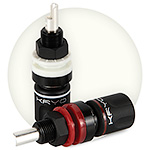Brass versus copper binding posts
Greetings all. My current speakers are the Usher Dancer Mini-X DMD. I recently removed the press on tabs that connect the internal speaker wires to the drivers and solder them directly with cardas silver. I perceive an increase in sound quality, and as we know perception is reality. I planned on doing the same thing at The binding posts. I assumed they were gold-plated copper. But when I put a small drill point into the end of the threaded post the color stayed the same where I expected to see an obvious copper color. I think this means my binding posts are brass. If I’m correct that seems like a cost saving decision by Usher. Would those of you who know more about this stuff than I do agree it would be worth the time and money needed to switch to some quality gold or rhodium plated copper binding posts? Thanks in advance
Ok, I should have stated that a silver coating will prevent the underlying copper from corroding, but silver itself corrodes. The company you quoted does say they apply an enamel coating over the silver, which would prevent corrosion. I studied the surface chemistry of silver for several years and I can unequivocally state that silver surfaces corrode fairly rapidly on exposure to the atmosphere. The primary corrosion species on silver are sulfur and sulfur containing compounds. Other corrosion species that I have found on silver surfaces include chlorine (Cl) and carbonates (CO3). | ||||
@ljgerens Wrote:
The company below disagrees: Mike https://www.ganpatiengineering.com/silver-coated-copper-wire-round.html | ||||
Ah, those darn connectors. Seems there is no perfect solution. Gold and Rhodium don't oxidize, but they are not very good conductors. I had an silver plated AQ rca plug that literally turned black. That can't be good. Here is another fact to drive ones OCD nuts. Just read how tin plated conductors react with gold. So that is another often ignored no-no. How about low mass copper to copper treated with ProGold? In the end, it will be a compromise like most things in life. | ||||
Silver does not prevent corrosion. In fact the silver surface is fairly reactive and can corrode fairly rapidly depending on the number of silver atoms on the surface that are not fully coordinated. Unlike copper which oxidizes to the +1 oxide (Cu2O) and +2 oxide (CuO), silver does not readily form oxides. Instead silver readily forms a sulfide (Ag2S). Both silver sulfide and the oxides of copper are semiconductors with similar band gaps. | ||||
Thanks again for all the help everybody. I contacted Usher in Taiwan and they emailed me that yes the binding posts are brass. The ETI items shown above were actually my first choice. I use their XLR connectors from the same family on my interconnects. Being that I would need four sets ends up to $600 to make the change that’s a lot of money. I have found a company named AECO in Taiwan that makes a similar binding posts for $60 a pair rather than $150. Model number ABI-0611 followed by a suffix of G, S or R that designates gold, silver or rhodium plating directly onto tellurium copper. All of my speaker cables are Clear Day silver with silver plated spades and bananas. So I think I will be ordering the silver plated versions. | ||||
I prefer solid copper binding post with heavy silver plating to prevent corrosion. See below:
Mike
| ||||
Typically, connectors and such will be made with one of the brass/copper alloys commonly used for electrical connections. Tellurium copper is a common choice or Muntz Metal, other alloys may be used for cost saving factors. After machining they will be copper flash plated, then finished plated with gold, silver, or other finishes. The plating is going to carry the electrical current so except for wear just about anything will work, even steel. | ||||




